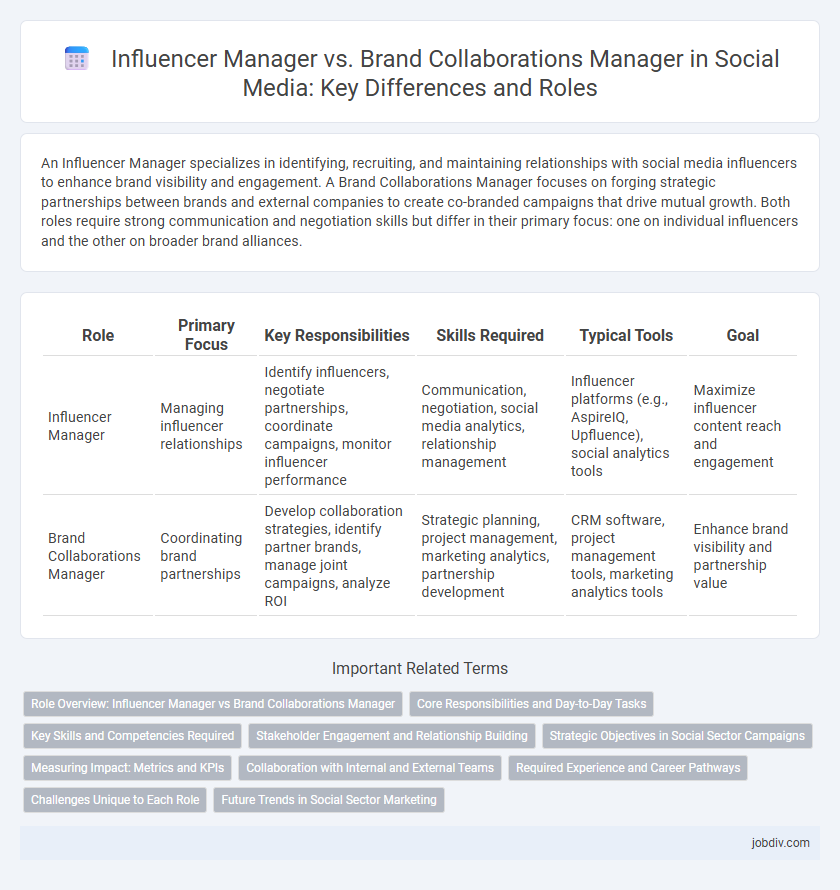An Influencer Manager specializes in identifying, recruiting, and maintaining relationships with social media influencers to enhance brand visibility and engagement. A Brand Collaborations Manager focuses on forging strategic partnerships between brands and external companies to create co-branded campaigns that drive mutual growth. Both roles require strong communication and negotiation skills but differ in their primary focus: one on individual influencers and the other on broader brand alliances.
Table of Comparison
| Role | Primary Focus | Key Responsibilities | Skills Required | Typical Tools | Goal |
|---|---|---|---|---|---|
| Influencer Manager | Managing influencer relationships | Identify influencers, negotiate partnerships, coordinate campaigns, monitor influencer performance | Communication, negotiation, social media analytics, relationship management | Influencer platforms (e.g., AspireIQ, Upfluence), social analytics tools | Maximize influencer content reach and engagement |
| Brand Collaborations Manager | Coordinating brand partnerships | Develop collaboration strategies, identify partner brands, manage joint campaigns, analyze ROI | Strategic planning, project management, marketing analytics, partnership development | CRM software, project management tools, marketing analytics tools | Enhance brand visibility and partnership value |
Role Overview: Influencer Manager vs Brand Collaborations Manager
An Influencer Manager oversees the development and execution of influencer marketing campaigns, managing relationships with individual creators to maximize brand visibility and engagement. In contrast, a Brand Collaborations Manager focuses on strategic partnerships between brands, coordinating joint marketing efforts to amplify reach and drive mutual growth. Both roles require strong communication skills but differ in target stakeholders and collaboration scale.
Core Responsibilities and Day-to-Day Tasks
An Influencer Manager primarily focuses on identifying, recruiting, and nurturing relationships with influencers to maximize brand visibility and engagement. They handle contract negotiations, campaign performance tracking, and ensure influencers deliver content aligned with brand guidelines. In contrast, a Brand Collaborations Manager oversees broader partnerships, coordinating cross-promotional campaigns, managing multi-platform collaborations, and aligning brand objectives with strategic marketing initiatives.
Key Skills and Competencies Required
An Influencer Manager requires expertise in relationship building, negotiation, and influencer marketing platforms to effectively engage and maintain a network of content creators. A Brand Collaborations Manager emphasizes strategic partnership development, campaign management, and brand alignment to drive collaborative initiatives that enhance brand visibility. Both roles demand strong communication, project management skills, and data-driven decision-making to optimize campaign performance and ROI.
Stakeholder Engagement and Relationship Building
An Influencer Manager specializes in identifying, recruiting, and nurturing relationships with individual influencers to amplify brand visibility through authentic social content and collaborations. A Brand Collaborations Manager focuses on broader strategic partnerships with companies, agencies, and larger entities to co-create campaigns that drive mutual business goals and market reach. Both roles require exceptional stakeholder engagement skills, but the Influencer Manager emphasizes personalized influencer rapport, whereas the Brand Collaborations Manager prioritizes corporate relationship management and long-term alliance building.
Strategic Objectives in Social Sector Campaigns
Influencer Managers focus on identifying and nurturing authentic relationships with key social media personalities to amplify campaign reach and engagement, ensuring alignment with target audience values and preferences. Brand Collaborations Managers prioritize strategic partnerships between brands and influencers, coordinating joint content creation and cross-promotional efforts to enhance brand visibility and credibility within social sector initiatives. Both roles drive social impact by optimizing influencer networks and collaborative strategies to maximize message penetration and campaign effectiveness.
Measuring Impact: Metrics and KPIs
Influencer Managers prioritize metrics such as engagement rate, follower growth, and content reach to evaluate the effectiveness of individual influencer campaigns. Brand Collaborations Managers emphasize overall brand lift, conversion rates, and return on investment (ROI) to measure the success of multi-channel partnerships. Both roles utilize social listening tools and performance analytics to optimize strategies and ensure alignment with business objectives.
Collaboration with Internal and External Teams
Influencer Managers coordinate closely with marketing, content, and PR departments to identify and engage ideal influencers, ensuring seamless communication between the brand and talent. Brand Collaborations Managers work with product development, sales, and external partners to create synergistic campaigns that align with overall brand strategy and market positioning. Both roles require strong collaboration with cross-functional teams to optimize campaign impact and drive cohesive brand messaging.
Required Experience and Career Pathways
An Influencer Manager typically requires experience in social media marketing, influencer relationship management, and content strategy, often advancing from roles like Social Media Coordinator or Marketing Assistant. In contrast, a Brand Collaborations Manager usually demands a background in partnership development, brand strategy, and negotiation, with career progression often originating from marketing, sales, or business development positions. Both pathways emphasize strong communication skills and the ability to analyze audience engagement for successful campaign execution.
Challenges Unique to Each Role
An Influencer Manager navigates the complexity of building genuine relationships with diverse creators, ensuring authentic content aligns with brand values while managing varying personalities and expectations. A Brand Collaborations Manager faces the challenge of harmonizing multiple brand partnerships, negotiating contracts, and maximizing ROI amid fluctuating market trends. Both roles require strategic communication skills and adaptability but differ in stakeholder management and performance measurement metrics.
Future Trends in Social Sector Marketing
Influencer Managers will increasingly leverage AI-driven analytics to identify micro-influencers who align with niche brand values, enhancing authentic engagement. Brand Collaborations Managers will focus on creating cross-platform immersive experiences using augmented reality (AR) and virtual reality (VR) to deepen consumer interaction and loyalty. Both roles will prioritize data privacy and ethical marketing practices while adapting to evolving social media algorithms and concerted community-building strategies.
Influencer Manager vs Brand Collaborations Manager Infographic

 jobdiv.com
jobdiv.com